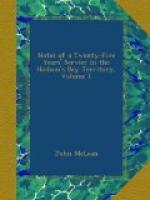If it be urged that the profits will be so much reduced by competition, that the trade will not be worth pursuing; I answer, that competition has certainly a natural tendency to reduce profits; but experience proves that it has also a tendency to reduce costs. A monopolist company never goes very economically to work; and, although much economy, or rather parsimony, of a very questionable and impolitic kind, has been of late years attempted to be introduced into the management of the Hudson’s Bay Company’s affairs, a free and fair competition will suggest economy of a sounder kind—the facilitating of transport, the improvement of portages, and the saving of labour. Where are the evils which interested alarmists predicted would follow the modification of the East India Company’s charter?
I have spoken of restrictions to be imposed on those who engage in the trade. These are;—that no one be allowed to engage in it without a licence from Government;—that these licensed traders should be confined to a certain locality, beyond which they should not move, on any pretext;—and that no spirituous liquors should be sold or given to the Indians under the severest penalties—such as the forfeiture of the offender’s licence, and of their right to participate in the trade in all time coming.
CHAPTER XX.
WESLEYAN MISSION—MR.
EVANS—ENCOURAGEMENT GIVEN BY THE
COMPANY—MR. EVANS’S
EXERTIONS AMONG THE INDIANS—CAUSES OF
THE WITHDRAWAL OF THE COMPANY’S
SUPPORT—CALUMNIOUS CHARGES
AGAINST MR. EVANS—MR.
E. GOES TO ENGLAND—HIS SUDDEN DEATH.
Allusion has been made in a former chapter to the Company’s encouragement of Missionaries; I shall now add a few facts by way of illustration.
The Rev. Mr. Evans, a man no less remarkable for genuine piety than for energy and decision of character, had been present at several of the annual meetings of the Indians at Manitoulin Island, and had felt his sympathy deeply awakened by the sight of their degradation and spiritual destitution. While thus affected, he received an invitation from the American Episcopal Methodists to go as a Missionary among the Indians resident in the Union. Feeling, however, that his services were rather due to his fellow-subjects, he resolved to devote his labours and his life to the tribes residing in the Hudson’s Bay territory. Having made known his intentions to this Canada Conference, he, together with Messrs. Thomas Hurlburt, and Peter Jacobs, was by them appointed a Missionary, and at their charges sent to that territory. No application was made to the Company, and neither encouragement nor support was expected from them. Mr. E. and his brother Missionaries began their operations by raising with their own hands, unassisted, a house at the Pic; themselves cutting and hauling the timber on the ice. They obtained, indeed, a temporary lodging at Fort Michipicoton, but they not only found




